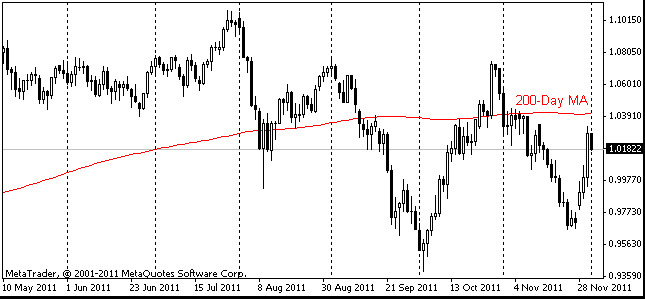EUR/usd
The euro is carving its way down. Our supposition that Friday would be quiet proved to be true for all markets except for the euro. The slack trading in most exchanges due to the absence of important news was accompanied by steady sales in the market of periphery sovereign EU bonds. And when the yield of Spanish 10yr bonds exceeded 7% and that of Italian bonds reached 6%, the selling of the euro became more dynamic. The maximal yield of Spanish bonds was just a step away from the record level in the history of the euro zone – 7.284% against the record 7.285%. Once again the general movement took place at the beginning of the American session. Earlier that week we observed just the opposite thing – purchases of the single currency. It seems that the large players fixed their profits made on the previous decline of EUR/USD and, after gaining some liquidity, again went about pressing the pair. Friday opened above 1.2270 and closed out around 1.2150. Today the pair opened even lower and is trading at 1.2120 on the events in Spain. The thing is that following the local government of Valencia, Catalonia has announced that it is also considering the possibility of turning to the central government for help. Let's be honest with ourselves. No matter how arrogant the Spanish are at first sight, they will hardly miss an opportunity to get money at a lower interest than in the open markets. Of course, for Europe it is more reasonable to help Spain rather than let the local banks crush the country with their debt load. Same with the central government of Spain – there's more sense in supporting the regions, rather than in allowing for the bankruptcy of at least one of them and as a result in giving rise to distrust of the rest of the local governments. However, while the centre is saving the periphery both at the European and local levels, the cost of this bailout keeps growing. Now even the low rate of the euro doesn't help business in Germany stay positive. Employment has almost stopped to grow, business sentiments are creeping down and the exporting nation finds it more and more difficult to find market outlets. And this is with the euro at the lowest in 2 years level against the dollar, in 4 years against the sterling, in 11 years against the yen and the record levels against the Australian, Canadian and New Zealand dollars. Against the last three currencies all these 4 years of the crisis have been an almost unbroken period of the euro decline.

GBP/USD
As has been mentioned above the pound is rather expensive against the euro now. For all that investors and traders keep buying it as the refuge for their capitals from the troubled euro. Meanwhile, the country's public finances are getting off the path of budget balancing. The Public Sector Net Borrowing data, released on Friday, proved to be not only worse than forecasted, but also showed a decline against the levels reported a year ago. The British government borrowed £12.1 bln against the expected 11.8bln and against 11.07bln in June 2011. Under such circumstances the Olympic Games in London, which are to begin in a few days, are at risk of being the only good news for the coming weeks.

EUR/JPY
The flight from the euro into liquid assets is very clearly seen in the dynamics of the yen today. The sales on Friday drove EUR/JPY from 96.50 to 94.70, where it keeps trading now. The demand for the yen is observed even in USD/JPY which this morning sank down to 78.16, the minimum of early June. With time it's getting clearer and clearer that the Japanese government won't do with monetary steps only, without resorting to interventions or some other limits on the capital flow.

AUD/USD
The failures of the euro and the overall risk aversion couldn't leave the aussie unaffected. AUD/USD has already dropped down to 1.03, though the Thursday maximum was fixed at 1.0430. Even the higher than expected producer price inflation failed to help the pair: in the second quarter PPI grew by 0.5%. Nevertheless, the annual price growth rate has slowed down just to 1.1% against the low 1.4% in the previous quarter. Expect the poor CPI on Wednesday.
